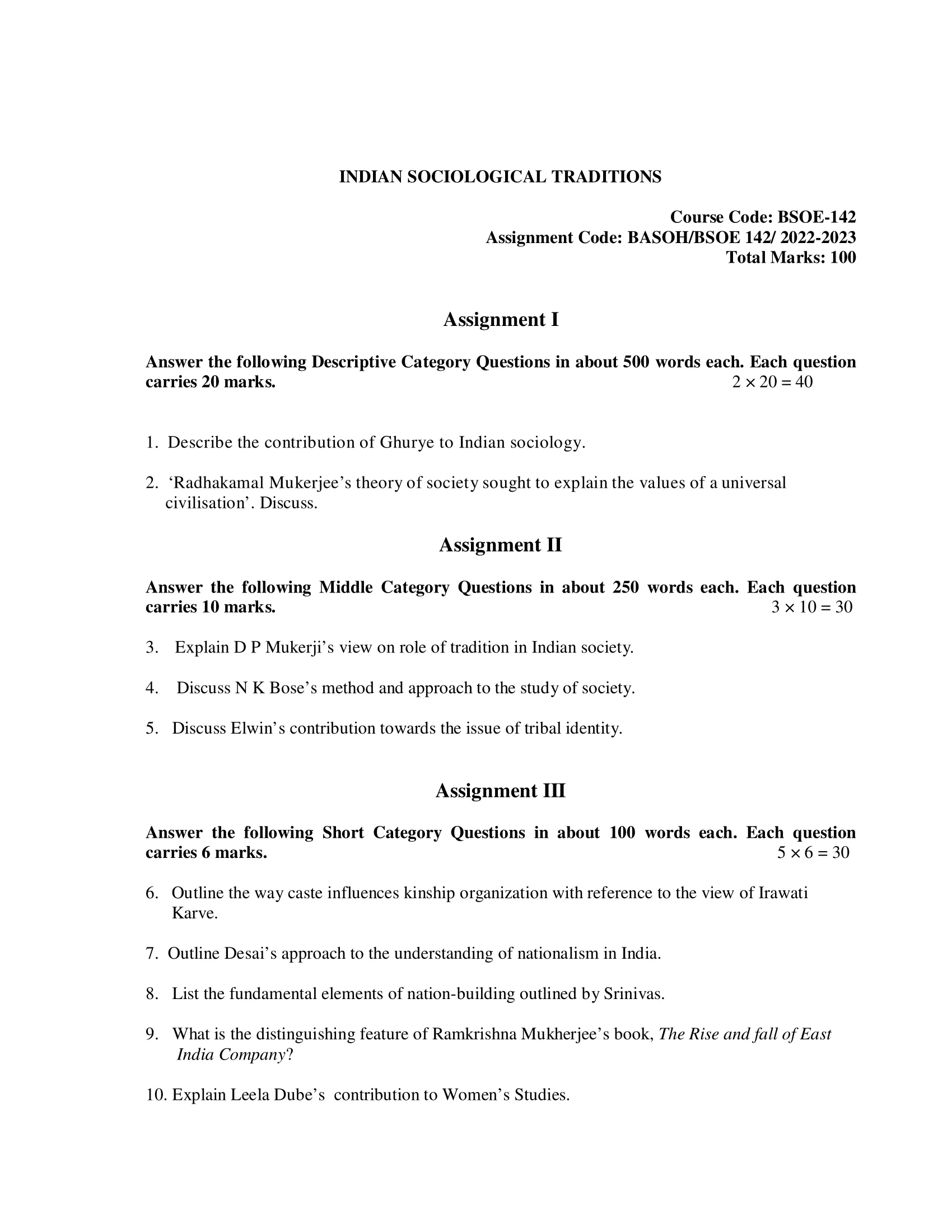
| Title | BSOE-142: IGNOU BAG Solved Assignment 2022-2023 |
| University | IGNOU |
| Degree | Bachelor Degree Programme |
| Course Code | BSOE-142 |
| Course Name | INDIAN SOCIOLOGICAL TRADITIONS |
| Programme Name | Bachelor of Arts (General) |
| Programme Code | BAG |
| Total Marks | 100 |
| Year | 2022-2023 |
| Language | English |
| Assignment Code | BASOH/BSOE 142/ 2022-2023 |
| Assignment PDF | Click Here |
| Last Date for Submission of Assignment: | For June Examination: 31st April For December Examination: 30th September |

Assignment I
Answer the following Descriptive Category Questions in about 500 words each. Each question carries 20 marks.
1. Describe the contribution of Ghurye to Indian sociology.
Ans: G. S. Ghurye was one of the most influential Indian sociologists of the 20th century. He was born in 1893 in Bombay, India and was educated at the University of Bombay, where he later became a professor of sociology. Ghurye was a pioneer in the field of Indian sociology, and his contributions to the discipline were significant in terms of the development of indigenous social theory.
Ghurye’s major contribution to Indian sociology was his attempt to formulate an indigenous sociology that was grounded in Indian social realities. He emphasized the importance of understanding the Indian context and culture while studying social phenomena in India. He argued that Western theories of social science were not always applicable in the Indian context, and that a distinct sociological perspective was needed that was relevant to the Indian social reality. In this regard, Ghurye rejected the notion of “universalism” in social science, and instead proposed a “particularistic” approach that was grounded in the cultural context of India.
Ghurye’s most famous work was his book, “Caste and Class in India”, which was first published in 1932. The book was a seminal contribution to the study of caste and class in India, and is considered a classic in the field of Indian sociology. In the book, Ghurye argued that caste was the most important social institution in India, and that it had a profound impact on all aspects of Indian society. He also argued that caste was not just a hierarchical system of social stratification, but that it was also a cultural institution that had deep religious and ritualistic roots.
Another significant contribution of Ghurye to Indian sociology was his emphasis on the study of Indian culture. He believed that the study of culture was crucial to understanding Indian society, and he emphasized the importance of understanding the complex interrelationships between culture, social structure, and social change. Ghurye’s work on Indian culture helped to establish the field of cultural sociology in India, and his insights on the subject continue to be relevant to this day.
In addition to his work on caste, class, and culture, Ghurye also made significant contributions to the study of family, kinship, and marriage in India. His work on these subjects provided a detailed and nuanced understanding of the dynamics of family life in India, and his insights continue to be relevant to the study of family and kinship in India today.
2. ‘Radhakamal Mukerjee’s theory of society sought to explain the values of a universal civilisation’. Discuss.
Ans: Radhakamal Mukerjee was one of the most prominent Indian sociologists of the 20th century. He was born in 1889 in Calcutta, India, and was educated at the University of Calcutta, where he later became a professor of sociology. Mukerjee’s theory of society sought to explain the values of a universal civilization, and his contributions to the field of sociology were significant in terms of the development of a global sociology.
Mukerjee’s theory of society was based on the idea that there were certain universal values that were shared by all human societies. These values were not specific to any one culture or society, but were a part of a universal civilization that transcended national and cultural boundaries. Mukerjee argued that these universal values were rooted in the basic needs and aspirations of human beings, and that they could be understood through the study of social institutions and cultural practices.
One of the key aspects of Mukerjee’s theory was his emphasis on the role of culture in shaping social values. He believed that culture was not just a reflection of social values, but that it also played a crucial role in shaping them. In this regard, Mukerjee argued that cultural practices and beliefs were important indicators of the values that were shared by members of a society.
Another important aspect of Mukerjee’s theory was his emphasis on the study of social change. He believed that social change was an inevitable aspect of human society, and that it was important to understand the factors that influenced social change. Mukerjee argued that social change was driven by a number of factors, including technological innovation, economic development, and changes in cultural values and beliefs.
Mukerjee’s contributions to the field of sociology were significant in terms of their impact on the development of a global sociology. He was a strong proponent of the idea that sociological theories and concepts should be applicable to all societies, not just Western societies. In this regard, Mukerjee was a strong critic of Western universalism in social science, and argued that sociological theories and concepts needed to be grounded in the cultural and social realities of the societies being studied.
Assignment II
Answer the following Middle Category Questions in about 250 words each. Each question carries 10 marks.
3. Explain D P Mukerji’s view on role of tradition in Indian society.
Ans: D P Mukerji, a noted Indian sociologist, emphasized the significance of tradition in Indian society. He believed that tradition is a crucial element that shapes the Indian society, culture, and lifestyle. According to Mukerji, tradition is not static but rather an evolving entity, which undergoes changes to adapt to the changing times.
Mukerji believed that tradition is vital for the Indian society’s stability and continuity, as it provides a sense of identity and continuity to people. He believed that tradition is a cultural inheritance that is passed on from one generation to another, shaping the individual’s personality and social behavior. He also saw tradition as a source of values, ethics, and beliefs that guide human behavior.
Furthermore, Mukerji believed that tradition is not a hindrance to progress but rather a catalyst for change. He argued that tradition provides a strong foundation upon which innovation and progress can be built. Mukerji believed that tradition can be reinterpreted and adapted to modern circumstances, thereby allowing for the development of new norms and values.
However, Mukerji also recognized that blind adherence to tradition could lead to social stagnation and hinder progress. He believed that the evolution of tradition is essential to keep pace with the changing social, economic, and political realities of India. Therefore, he emphasized that tradition should be approached critically and reinterpreted in a way that is relevant to the contemporary context.
4. Discuss N K Bose’s method and approach to the study of society.
Ans: N K Bose was an Indian sociologist who made significant contributions to the study of Indian society. He developed a unique method and approach to the study of society, which emphasized the importance of both empirical data and theoretical concepts.
Bose believed that the study of society should be based on empirical evidence collected through direct observation and measurement. He advocated for the use of both qualitative and quantitative research methods to collect data on social phenomena. Bose argued that empirical data are essential for understanding the complex social structures and processes that shape human behavior.
However, Bose also believed that empirical data alone are not sufficient for understanding society. He emphasized the importance of theoretical concepts to analyze and interpret the data. Bose developed a theoretical framework that drew on the works of Western sociologists such as Durkheim, Weber, and Marx, as well as Indian thinkers such as Tagore, Gandhi, and Ambedkar. He believed that a theoretical framework was necessary to make sense of the empirical data and to develop insights into the nature of Indian society.
Bose’s approach to the study of society was also interdisciplinary. He believed that the study of society should draw on insights from other disciplines such as history, anthropology, economics, and political science. He argued that interdisciplinary approaches would lead to a more comprehensive understanding of society and its complexities.
Moreover, Bose emphasized the importance of studying both the individual and the collective in society. He believed that society was made up of individuals, and understanding the behavior and actions of individuals was essential for understanding the workings of society as a whole. He also recognized the importance of social structures and institutions in shaping individual behavior and thought.
5. Discuss Elwin’s contribution towards the issue of tribal identity.
Ans: Verrier Elwin was an anthropologist, writer, and activist who made significant contributions towards the study of Indian tribes, their identity, and the issues they faced. He was one of the first anthropologists to take a sympathetic and humanistic approach to the study of tribes, which had previously been studied as primitive and backward communities.
One of Elwin’s significant contributions was towards the issue of tribal identity. He recognized that the colonial experience had a profound impact on the identity of tribal communities. The British colonial administration in India imposed their culture and norms on the tribal communities, leading to a loss of their cultural identity. Elwin recognized that tribal identity was not a static concept, but a dynamic and evolving one, which could change over time.
Elwin advocated for the preservation of tribal identity and culture. He believed that tribal communities should be allowed to maintain their unique cultural practices, languages, and customs, without interference from external forces. He also recognized the importance of recognizing the diversity within tribal communities, which had been previously ignored.
Furthermore, Elwin was a strong advocate for tribal rights and their participation in the democratic process. He believed that the tribal communities should have a say in the policies that affected their lives and that their voices should be heard in the decision-making process. He also recognized the importance of education in empowering the tribal communities and providing them with the tools to advocate for their rights.
Elwin’s work on tribal identity was also influential in shaping the Indian government’s policies towards tribal communities. His advocacy for the preservation of tribal identity and culture helped to shape the Indian Constitution’s provisions for tribal communities, which recognized their unique cultural practices and provided for their protection.
Assignment III
Answer the following Short Category Questions in about 100 words each. Each question carries 6 marks.
6. Outline the way caste influences kinship organization with reference to the view of Irawati Karve.
Ans: Irawati Karve, an Indian sociologist, argued that caste influences kinship organization in India. She posited that caste determines who can marry whom, and that this, in turn, influences the organization of kinship. In a caste-based society, people are expected to marry within their own caste, and this means that there are restrictions on who can marry whom. These restrictions result in the formation of endogamous groups, which have a significant impact on kinship organization. The endogamous group becomes the primary kinship unit, and individuals identify primarily with their caste and the kinship ties that are formed within it.
7. Outline Desai’s approach to the understanding of nationalism in India.
Ans: D. R. Desai was an Indian sociologist who contributed significantly to the study of nationalism in India. Desai’s approach to understanding nationalism was rooted in his belief that nationalism in India was a unique phenomenon that needed to be studied within the specific historical, social, and cultural contexts of India.
Desai argued that nationalism in India emerged as a response to colonialism, and that it was shaped by India’s social and cultural diversity. He believed that Indian nationalism was not based on a single culture or language, but rather, it was a composite of various regional cultures and languages.
According to Desai, the evolution of Indian nationalism was characterized by three distinct phases. The first phase was marked by a desire for political freedom from British colonial rule. The second phase was focused on the formation of a national identity, and the third phase was marked by efforts to build a strong, unified nation-state.
Desai also argued that Indian nationalism was influenced by various socio-economic factors, including the growth of the middle class, the spread of education, and the rise of new social movements. These factors created a sense of shared identity and a common desire for self-rule among diverse groups in Indian society.
Furthermore, Desai emphasized the role of cultural symbols and traditions in shaping Indian nationalism. He believed that cultural symbols, such as language, religion, and traditions, played an important role in defining and unifying the Indian nation. These symbols were used to create a sense of shared identity and to distinguish Indian nationalism from other nationalist movements around the world.
8. List the fundamental elements of nation-building outlined by Srinivas.
Ans: M.N. Srinivas was a prominent sociologist who made significant contributions to the study of Indian society and culture. In his work on nation-building, Srinivas outlined five fundamental elements that he believed were necessary for the successful building of a nation. These elements are:
- A sense of history: This involves the development of a shared understanding of the nation’s history and its significance for the present and the future.
- A sense of territoriality: This involves the development of a shared understanding of the nation’s territorial boundaries and its significance for the nation’s identity and unity.
- A sense of common culture: This involves the development of a shared understanding of the nation’s cultural heritage and the promotion of a common national culture.
- A sense of solidarity: This involves the development of a shared sense of national identity and a commitment to the nation’s welfare and progress.
- A sense of political community: This involves the development of a shared sense of citizenship and a commitment to the democratic principles of equality, liberty, and justice.
According to Srinivas, these fundamental elements are necessary for the successful building of a nation, and any attempt to build a nation that neglects or undermines these elements is likely to be unsuccessful.
9. What is the distinguishing feature of Ramkrishna Mukherjee’s book, The Rise and fall of East India Company?
Ans: Ramkrishna Mukherjee’s book, “The Rise and Fall of the East India Company,” is a seminal work on the history of the British East India Company. The book’s distinguishing feature is its focus on the internal workings of the company, as opposed to its external interactions with Indian society and culture. Mukherjee’s research draws on a vast array of primary sources, including the company’s archives, to provide a detailed account of the company’s organizational structure, the functioning of its various departments, and the decision-making processes of its leadership. The book also explores the role of individuals within the company and the complex relationships between them. Mukherjee’s analysis provides insights into the internal dynamics of the company and sheds light on the factors that contributed to its rise and eventual decline. The book’s focus on the internal workings of the East India Company makes it a unique and invaluable contribution to the study of British colonialism in India.
10. Explain Leela Dube’s contribution to Women’s Studies.
Ans: Leela Dube was an Indian sociologist who made significant contributions to the field of women’s studies. She was one of the pioneers of feminist scholarship in India and was instrumental in establishing the Centre for Women’s Development Studies in New Delhi. Dube’s work focused on the social and economic status of women in India and their experiences of gender-based oppression. She conducted research on issues such as dowry, gender and work, and women’s movements. Dube’s work highlighted the need to recognize the diversity of women’s experiences and to incorporate gender perspectives into sociological research. Her contributions to women’s studies continue to be influential in India and beyond.
How to Download BSOE-142 Solved Assignment?
You can download it from the www.edukar.in, they have a big database for all the IGNOU solved assignments.
Is the BSOE-142 Solved Assignment Free?
Yes this is absolutely free to download the solved assignment from www.edukar.in
What is the last submission date for BSOE-142 Solved Assignment?
For June Examination: 31st April, For December Examination: 30th October







